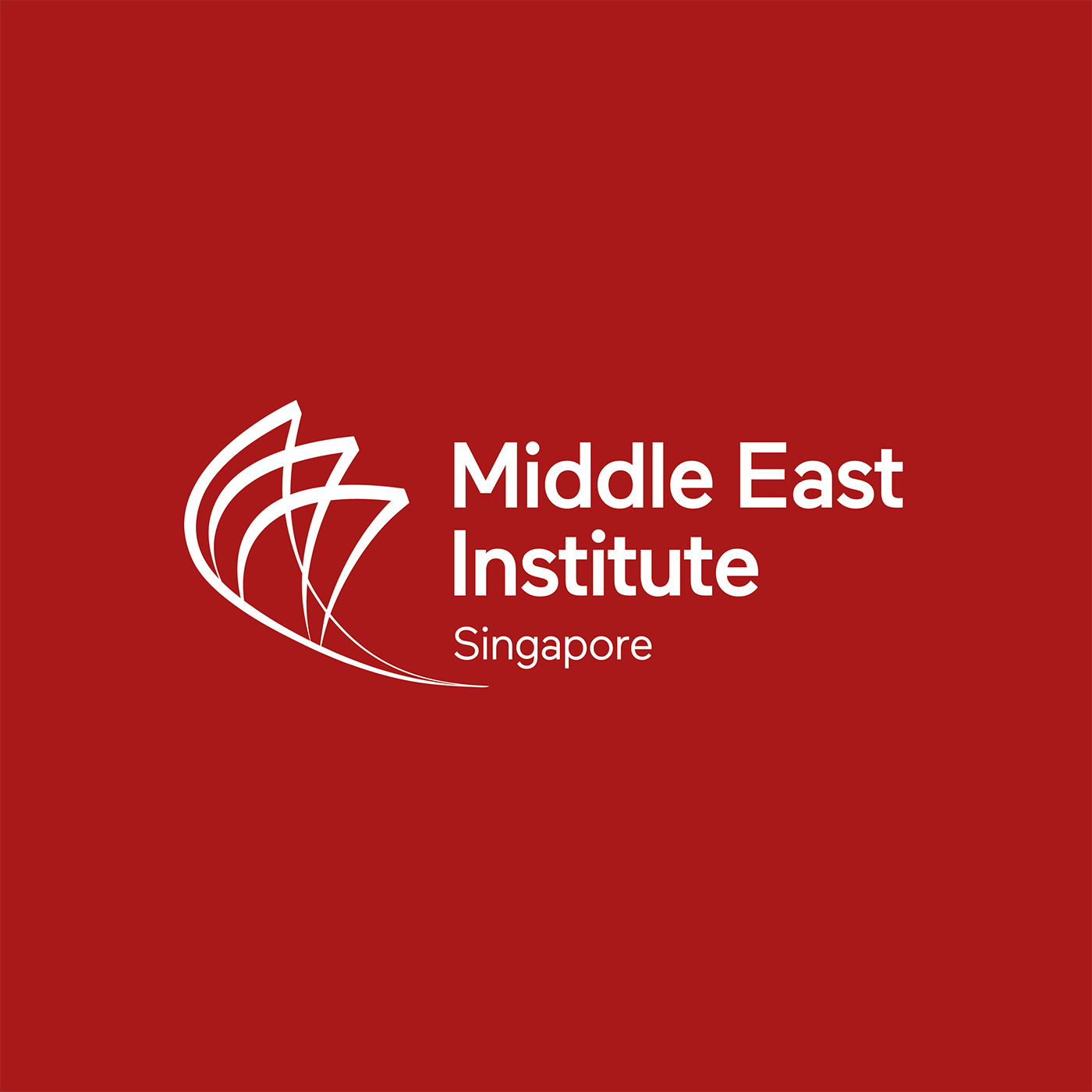Episodes
![[Book Talk] The Lost Decade - The US Pivot to Asia and the Rise of Chinese Power](https://pbcdn1.podbean.com/imglogo/ep-logo/pbblog4563756/Video_Opening_Title_copy_hbv9td_300x300.png)
Tuesday Jul 16, 2024
[Book Talk] The Lost Decade - The US Pivot to Asia and the Rise of Chinese Power
Tuesday Jul 16, 2024
Tuesday Jul 16, 2024
This event is organised by MEI Political Economy Cluster in collaboration with S. Rajaratnam School of International Studies (RSIS).
Lost Decade is an essential guide for understanding the historic shift to Asia-centric geopolitics and its implications for the United States’ present and future.
Across the political spectrum, there is wide agreement that Asia should stand at the center of U.S. foreign policy. But this worldview, first represented in the Barack Obama administration’s 2011 “Pivot to Asia,” marks a dramatic departure from the entire history of American grand strategy. More than a decade on, we now have the perspective to evaluate it in depth. In Lost Decade, Robert D. Blackwill and Richard Fontaine—two eminent figures in American foreign policy—take this long view. They conclude that while the Pivot’s strategic logic is strong, there are few successes to speak of, and that we need a far more coherent approach to the Indo-Pacific region. They examine the Pivot through various lenses: situating it historically in the context of U.S. global foreign policy, revealing the inside story of how it came about, assessing the effort thus far, identifying the ramifications in other regions (namely Europe and the Middle East), and proposing a path forward.
The authors stress that the United States has far less margin for foreign policy error today than a decade ago. As the international order becomes more unstable, Blackwill and Fontaine argue that it is imperative that policymakers fully understand what the Pivot to Asia aimed to achieve—and where it fell short—in order to muster the resources, alliances, and resolve to preserve an open order in Asia and the world. Crafting an effective policy for the region, they contend, is crucial for preserving American security, prosperity, and democratic values.
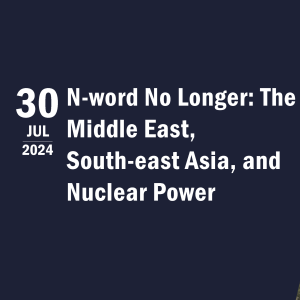
Wednesday Aug 28, 2024
N-word No Longer: The Middle East, South-east Asia, and Nuclear Power
Wednesday Aug 28, 2024
Wednesday Aug 28, 2024
After years of opposition, nuclear power is enjoying renewed appeal around the world.
A key reason for this is an urgency to mitigate the impact of climate change by pursuing clean energy sources. Geopolitical events, such as the Russia-Ukraine war, have likewise intensified the drive for energy security.
In South-east Asia, Singapore is exploring nuclear power, while the Philippines, Indonesia, and Vietnam have announced plans to build plants. This marks a turnaround from years of government and public opposition. Similarly, in the Middle East, Saudi Arabia is actively studying the issue, and is seeking a deal on civilian nuclear programme with the US, while the UAE already as an operational plant.
This webinar will discuss what is behind the sudden change in perceptions towards nuclear energy, the paradox of Gulf countries with vast oil reserves turning to an alternative energy source, and the international controls needed to prevent civilian nuclear programmes from morphing into military ones.
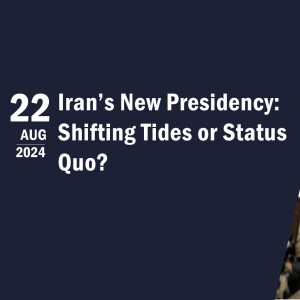
Wednesday Aug 28, 2024
Iran’s New Presidency: Shifting Tides or Status Quo?
Wednesday Aug 28, 2024
Wednesday Aug 28, 2024
Iran’s new president, Masoud Pezeshkian, is deemed a reformist whose “balanced” foreign policy approach may be the answer to Iran’s complex international relations, including ongoing tensions with the West, the Israel-Gaza conflict, and uranium enrichment concerns. While he has been endorsed by Ayatollah Ali Khamenei, any West-ward overture by Mr Pezeshkian will require the Supreme Leader’s assent. Tehran’s relations with Russia and China will also complicate any talk about sanctions relief, with a new US administration looming in the background.
Mr Pezeshkian’s presidency should also be measured against the backdrop of public sentiment. The backdrop of a low voter turnout, widespread discontent over Iran’s economic malaise, and recent crackdowns on dissent, pose significant domestic challenges.
What do the recent presidential elections results say about the regime’s legitimacy? What are the implications for succession planning for a new Supreme Leader? Can Mr Pezeshkian’s pragmatic approach improve Iran’s economy while navigating complex international relationships? The Middle East Institute will host a panel of experts to examine the significance of Mr Pezeshkian’s victory, and his vision for Iran’s domestic and foreign policy landscape.
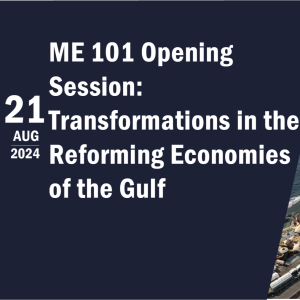
Wednesday Aug 28, 2024
ME 101 Opening Session: Transformations in the Reforming Economies of the Gulf
Wednesday Aug 28, 2024
Wednesday Aug 28, 2024
MEI in collaboration with the SUSS DBA Alumni Graduate Student Community (DBAC) and the SUSS School of Business
Throughout history, the Middle East has been at the forefront of global change, engaging with the West through crusades, wars, colonialism, and terrorism. Beyond these familiar narratives lies a region undergoing profound economic transformation, cultural evolution, and facing pressing environmental challenges. This lecture series will examine these key aspects and drivers of change, with an emphasis on how these transformations impact regional stability and present significant economic opportunities, particularly for Singapore’s strategic interests.
This year, we are excited to introduce a new format for the ME 101 series in collaboration with the SUSS DBA Alumni Graduate Student Community (DBAC) and the SUSS School of Business. The series is specifically designed for top business leaders and professionals who are interested in exploring the economic potential that the Middle East holds.
The opening lecture addresses the socio-economic changes in the Gulf Arab states, why Singapore is interested in these transformations, and the extent to which the oil monarchies have diversified their economies. Intertwined with economic ambitions are social policies which aim to create appealing living and work environments for expatriates. Profiling on the global stage also constitutes a foreign policy goal, whether it is through the hosting of mega-events, or through investments in sport. More than weaning themselves off oil and gas, the Gulf leaderships are also diversifying their international partnerships, turning away from the West and looking elsewhere, particularly
the East.
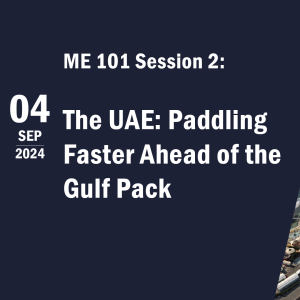
Saturday Sep 07, 2024
ME 101 Session Two: The UAE - Paddling Faster Ahead of the Gulf Pack
Saturday Sep 07, 2024
Saturday Sep 07, 2024
MEI in collaboration with the SUSS DBA Alumni Graduate Student Community (DBAC) and the SUSS School of Business
Throughout history, the Middle East has been at the forefront of global change, engaging with the West through crusades, wars, colonialism, and terrorism. Beyond these familiar narratives lies a region undergoing profound economic transformation, cultural evolution, and facing pressing environmental challenges. This lecture series will examine these key aspects and drivers of change, with an emphasis on how these transformations impact regional stability and present significant economic opportunities, particularly for Singapore’s strategic interests.
The United Arab Emirates (UAE) has embarked on a series of reforms in order to position itself as an oasis of tolerance and an attractive destination for foreign talent and investors. Notable changes include advocating religious tolerance and a respect for personal faiths. These make up an overhaul of the personal and family laws, which now allow cohabitation between unmarried couples, and dangling citizenships to selected foreigners. Such moves constitute an awareness by the Emirati leadership that it will have to act swiftly to stay ahead of neighbouring competitors such as Saudi Arabia and Qatar if it wishes to become the top talent destination. But social questions persist
despite this renewed drive to take the country further forward, particularly debates on national identity.

Monday Sep 16, 2024
Feeling the Heat: Gulf States and Climate Shifts
Monday Sep 16, 2024
Monday Sep 16, 2024
Across the MENA region, environmental challenges are rising, but the six Gulf Arab states—Saudi Arabia, the UAE, Kuwait, Oman, Qatar, and Bahrain—are feeling the impact the most. With economies built on oil and gas, they’re now on the frontlines of climate change.
COP28 in Dubai last year called for urgent action, but what are Gulf countries actually doing? How are they tackling climate risks while trying to diversify their economies?
In our 34th episode, we spoke to Aisha Al-Sarihi. She is a Research Fellow at the Middle East Institute at the National University of Singapore. She is also a Research Associate at Chatham House, and a Non-Resident Fellow the Middle East Council on Global Affairs and the Arab Gulf States Institute in Washington.
Her research focuses on political economy, geopolitics, policy and governance of energy transition, climate and environment, with a focus on the Middle East and Southeast Asia.
In this episode, we covered several topics including
- A deep dive into Gulf states' energy commitments and net-zero policies
- The importance of deploying capital for climate projects
- The challenges in mitigating climate risks in economic diversification
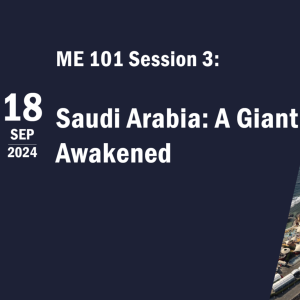
Monday Sep 23, 2024
ME 101 session 3 - Saudi Arabia: A Giant Awakened
Monday Sep 23, 2024
Monday Sep 23, 2024
Throughout history, the Middle East has been at the forefront of global change, engaging with the West through crusades, wars, colonialism, and terrorism. Beyond these familiar narratives lies a region undergoing profound economic transformation, cultural evolution, and facing pressing environmental challenges. This lecture series will examine these key aspects and drivers of change, with an emphasis on how these transformations impact regional stability and present significant economic opportunities, particularly for Singapore’s strategic interests.
This series is specifically designed for top business leaders and professionals who are interested in exploring the economic potential that the Middle East holds.
Session 3:
In 2016, Saudi Arabia launched its Vision 2030, which is aimed at economic diversification, and social development. After decades of dormancy, the pursuit of this vision has shifted Saudi Arabia from a conservative society towards a somewhat more liberal and open society, emerging as a giant economic force in the region. From the abolition of a longstanding law that prevented women from driving to promoting entertainment, tourism, high-tech and AI sectors, and hosting international events in sport, business and entertainment, this lecture will discuss these state-led economic, social, cultural, legal, and religious transformations. The lecture will also assess the progress and challenges encountered in this transformative process, eight years since its launch. Finally, it will examine the geopolitical ramifications of the Kingdom’s pursuit of its 2030 economic goals.
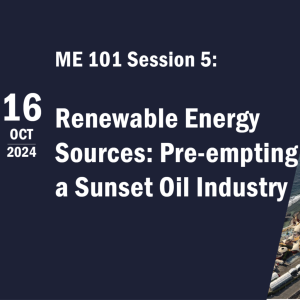
Wednesday Oct 23, 2024
ME 101 Session 5: Renewable Energy Sources: Pre-empting a Sunset Oil Industry
Wednesday Oct 23, 2024
Wednesday Oct 23, 2024
Throughout history, the Middle East has been at the forefront of global change, engaging with the West through crusades, wars, colonialism, and terrorism. Beyond these familiar narratives lies a region undergoing profound economic transformation, cultural evolution, and facing pressing environmental challenges. This lecture series will examine these key aspects and drivers of change, with an emphasis on how these transformations impact regional stability and present significant economic opportunities, particularly for Singapore’s strategic interests.
This year, we are excited to introduce a new format for the ME 101 series in collaboration with the SUSS DBA Alumni Graduate Student Community (DBAC) and the SUSS School of Business. The series is specifically designed for top business leaders and professionals who are interested in exploring the economic potential that the Middle East holds.
. . . . .
Session 5:
With an eye on a future beyond oil, the Gulf countries are marching ahead with an ambitious domestic transition to renewable energy. From investing in renewables, nuclear, hydrogen, electric vehicles, and carbon capture to climate diplomacy, and hosting world’s major international climate meetings such as COP 28 in the UAE), Gulf countries aspire to secure their position as leaders in both clean energy, as well as transition the oil and gas industry in the evolving energy landscape. This lecture delves into ambitious plans to become global leaders in the new energy
industry. It will explore the motives driving the Gulf states’ renewable energy transition, examine the diverse strategies employed to “transition away from fossil fuels”, and examine the implications of these strategies on the global energy outlook.
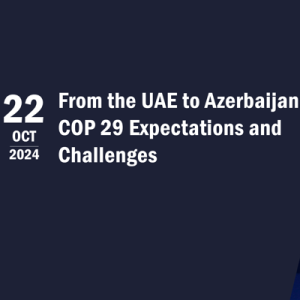
Thursday Oct 24, 2024
From the UAE to Azerbaijan: COP 29 Expectations and Challenges
Thursday Oct 24, 2024
Thursday Oct 24, 2024
Azerbaijan will host the 29th session of the Conference of the Parties to the United Nations Framework Convention on Climate Change (COP29) in November 2024. The conference will pick up where COP28 left off: The completion of the first global stocktake, the consensus to “transition away” from fossil fuels, and agreements for a massive expansion of clean energy, among others.
While COP meetings have made significant strides in forging consensus in major areas — mitigation, adaptation, and finance — the pace of implementation is too slow to address the urgent challenges posed by climate change.
This webinar, hosted in collaboration with the UAE Embassy in Singapore, aims to discuss the key outcomes of COP 28, expectations for COP 29, and whether it will further advance the UAE-led consensus on finance and fossil fuels. It also aims to shed light on the persistent gap between COP outcomes and their implementation. Featuring examples from Singapore and the UAE, it will explore how countries can benefit from multilateral platforms to translate international climate agreements into meaningful national policies.
![[Book Launch] How to Lose a War: The Story of America’s Intervention in Afghanistan](https://pbcdn1.podbean.com/imglogo/ep-logo/pbblog4563756/Video_Opening_Title_-_closing_session_book_launch_Page_1_Page_17914a_300x300.jpg)
Wednesday Dec 04, 2024
[Book Launch] How to Lose a War: The Story of America’s Intervention in Afghanistan
Wednesday Dec 04, 2024
Wednesday Dec 04, 2024
The US’s failed intervention in Afghanistan
The question of what caused America’s Afghanistan debacle or, in other words, where the US, backed by NATO and non-NATO allies, went wrong, has been widely debated from varying perspectives. However, there has not been an insightful and coherent expose of what led the US to move from its initial ‘light footprint’ approach to a ‘heavy footprint’ one, which trapped the US in the complex task of state-building in a country that traditionally lacked the necessary foundations for statehood. The move marked a turning point in entangling the US in a long and unwinnable war and therefore ultimate defeat.
Drawing on his book How to Lose a War, Prof Saikal will address critically the key factors that contributed to the US failures and narrate the important lessons learned from America’s Afghanistan experience.

